|
|
|
Sort Order |
|
|
|
Items / Page
|
|
|
|
|
|
|
| Srl | Item |
| 1 |
ID:
124389
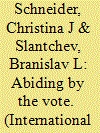

|
|
|
|
|
| Publication |
2013.
|
| Summary/Abstract |
We analyze institutional solutions to international cooperation when actors have heterogeneous preferences over the desirability of the action and split into supporters and opponents, all of whom can spend resources toward their preferred outcome. We study how actors can communicate their preferences through voting when they are not bound either by their own vote or the outcome of the collective vote. We identify two organizational types with endogenous coercive enforcement and find that neither is unambiguously preferable. Like the solutions to the traditional Prisoners' Dilemma these forms require long shadows of the future to sustain. We then show that cooperation can be sustained through a noncoercive organization where actors delegate execution to an agent. Even though this institution is costlier, it does not require any expertise by the agent and is independent of the shadow of the future, and thus is implementable when the others are not
|
|
|
|
|
|
|
|
|
|
|
|
|
|
|
|
| 2 |
ID:
124384
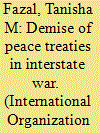

|
|
|
|
|
| Publication |
2013.
|
| Summary/Abstract |
The conclusion of peace treaties following war was a norm of international politics for millennia. Since approximately 1950, however, the rate at which interstate wars have ended with a formal peace treaty has declined dramatically. I argue that the costs of concluding peace treaties have risen with the development of the modern canon of the law of war. Using an original data set, I find that states today prefer to avoid admitting to a state of war and risk placing their leaders and soldiers at risk of punishment for any violations of the law of war.
|
|
|
|
|
|
|
|
|
|
|
|
|
|
|
|
| 3 |
ID:
124397
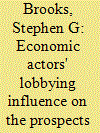

|
|
|
|
|
| Publication |
2013.
|
| Summary/Abstract |
Political scientists and economists have long been interested in the role of special interests in the policymaking process. In the past few years, a series of important new books have argued forcefully that the lobbying activities of economic actors have an important influence on the prospects for war and peace. All of these analyses claim that whether economic actors enhance or decrease the likelihood of conflict ultimately depends on the domestic political balance between economic actors who have a strong vested interest in pushing for peace versus those that do not. I advance two contrary arguments. At least among the advanced states, I posit there are no longer any economic actors who will be favorable toward war and who will lobby the government with this preference. All of the identified mechanisms that previously contributed to such lobbying in these states have been swept away with the end of colonialism and the rise of economic globalization. In particular, I show that the current structure of the global economy now makes it feasible for foreign direct investment to serve as an effective substitute for conquest in a way that was not possible in previous eras. My second argument concerns those economic actors in advanced states with a preference for peace. I posit that it has become unnecessary for them to directly lobby the government to avoid war on economic grounds because economic globalization-the accumulation of decisions by economic actors throughout the globe-now has sufficiently clear economic incentives for leaders.
|
|
|
|
|
|
|
|
|
|
|
|
|
|
|
|
| 4 |
ID:
124395
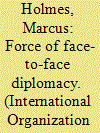

|
|
|
|
|
| Publication |
2013.
|
| Summary/Abstract |
Face-to-face diplomacy has long been the lynchpin of international politics, yet it has largely been dismissed as irrelevant in theories of cooperation and conflict-as "cheap talk" because leaders have incentives to dissemble. However, diplomats and leaders have argued for years that there is often no substitute for personally meeting a counterpart to hash out an agreement. This article argues that face-to-face diplomacy provides a signaling mechanism that increases the likelihood of cooperation. Face-to-face meetings allow individuals to transmit information and empathize with each other, thereby reducing uncertainty, even when they have strong incentives to distrust the other. The human brain has discrete architecture and processes devoted to parsing others' intentions via cues in face-to-face interaction. These processes enable actors to directly access the intentions of others with a higher degree of certainty than economic and game-theoretic models of bargaining predict.
|
|
|
|
|
|
|
|
|
|
|
|
|
|
|
|
| 5 |
ID:
124398
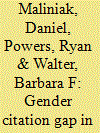

|
|
|
|
|
| Publication |
2013.
|
| Summary/Abstract |
This article investigates the extent to which citation and publication patterns differ between men and women in the international relations (IR) literature. Using data from the Teaching, Research, and International Policy project on peer-reviewed publications between 1980 and 2006, we show that women are systematically cited less than men after controlling for a large number of variables including year of publication, venue of publication, substantive focus, theoretical perspective, methodology, tenure status, and institutional affiliation. These results are robust to a variety of modeling choices. We then turn to network analysis to investigate the extent to which the gender of an article's author affects that article's relative centrality in the network of citations between papers in our sample. Articles authored by women are systematically less central than articles authored by men, all else equal. This is likely because (1) women tend to cite themselves less than men, and (2) men (who make up a disproportionate share of IR scholars) tend to cite men more than women. This is the first study in political science to reveal significant gender differences in citation patterns and is especially meaningful because citation counts are increasingly used as a key measure of research's quality and impact.
|
|
|
|
|
|
|
|
|
|
|
|
|
|
|
|
| 6 |
ID:
124386
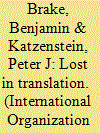

|
|
|
|
|
| Publication |
2013.
|
| Summary/Abstract |
In recent years U.S. legal norms and practices reconfigured important elements of how law is thought of and practiced in both common and civil law countries around the world. With specific focus on the spread of American procedural practices (class action and pretrial discovery), this article applies a transactional view of law that emphasizes the private practice of law and nonstate actors. Such an approach highlights important aspects of world politics overlooked by traditional analyses of international legalization, conventionally understood as the direct spread of law by and among states. We find that the movement of law is a dynamic process involving diffusion, translation, and the repeated transnational exchanges of legal actors. Through our examination of this process, we offer insights into how aspects of American law moved into unlikely jurisdictions to reshape legal theory, pedagogy, procedure, and the organizing structure of the legal profession.
|
|
|
|
|
|
|
|
|
|
|
|
|
|
|
|
| 7 |
ID:
124394
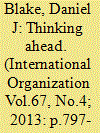

|
|
|
|
|
| Publication |
2013.
|
| Summary/Abstract |
International institutions help governments make credible commitments to other state and nonstate actors by raising the costs of commitment violation. However, in doing so these institutions generate sovereignty costs for national governments by constraining the autonomy they have to develop and implement policy. Governments respond to this trade-off between the credibility of commitments and policy autonomy differently depending on their time horizons and this shapes their preferences over the design of credibility-enhancing institutions. Governments with long time horizons expect to govern in the future, anticipate that conditions may shift over time, and therefore seek institutional designs that will afford them greater freedom to modify policies in response to changing economic and political conditions. Governments with shorter time horizons, on the other hand, do not anticipate being in power long into the future and therefore are less concerned about maintaining greater room to manipulate policy. I develop this argument in the context of bilateral investment treaties (BITs), focusing in particular on the legalization of obligation in national treatment commitments. I test the argument using an original data set of the design of national treatment obligations in a random sample of 342 BITs. I find that net importers of FDI with longer time horizons are more likely to build in greater policy autonomy in their BITs by scaling back the legalization of their national treatment obligations and that this relationship is robust to controlling for selection into investment treaties.
|
|
|
|
|
|
|
|
|
|
|
|
|
|
|
|
| 8 |
ID:
124383
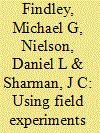

|
|
|
|
|
| Publication |
2013,
|
| Summary/Abstract |
Efforts to fight international money laundering, corruption, and terrorist financing depend crucially on the prohibition barring the formation of anonymous shell companies+ To study the effectiveness of this prohibition, we perform the first international relations ~IR! field experiment on a global scale+ With university institutional review board ~IRB! clearance, we posed as consultants requesting confidential incorporation from 1,264 firms in 182 countries+ Testing arguments drawn from IR theory, we probe the treatment effects of specifying ~1! the international standards ~managerialism!, ~2! penalties for noncompliance with these standards ~rationalism!, ~3! the desire to follow norms through complying with international standards
|
|
|
|
|
|
|
|
|
|
|
|
|
|
|
|
|
|
|
|
|